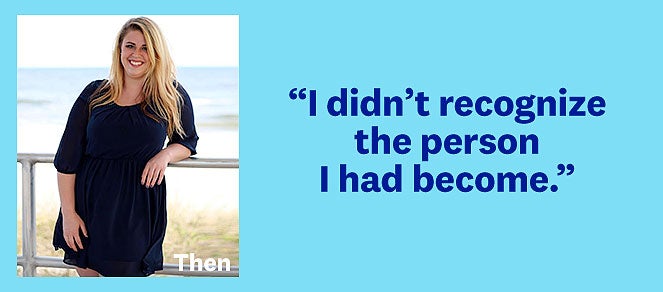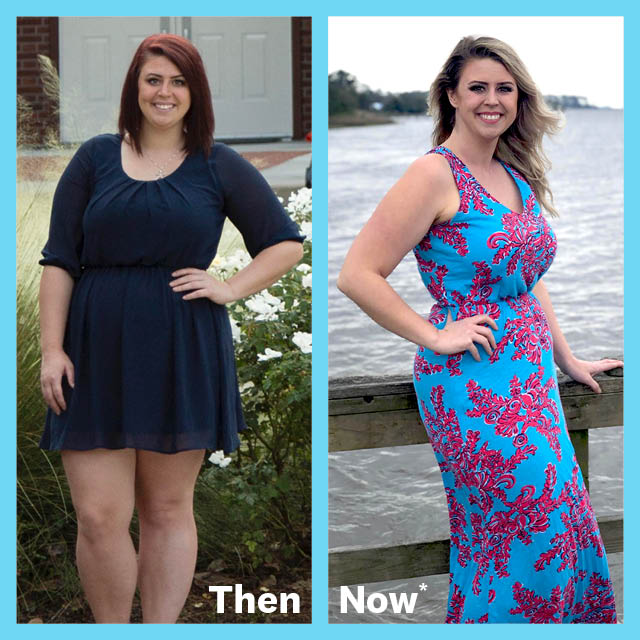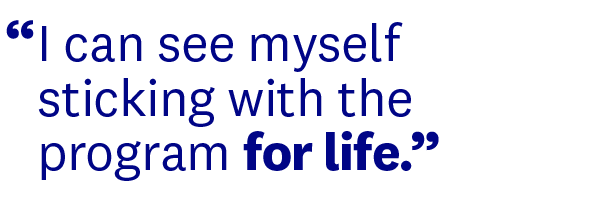I Tried Keto, Then WW. Here's What Actually Worked.
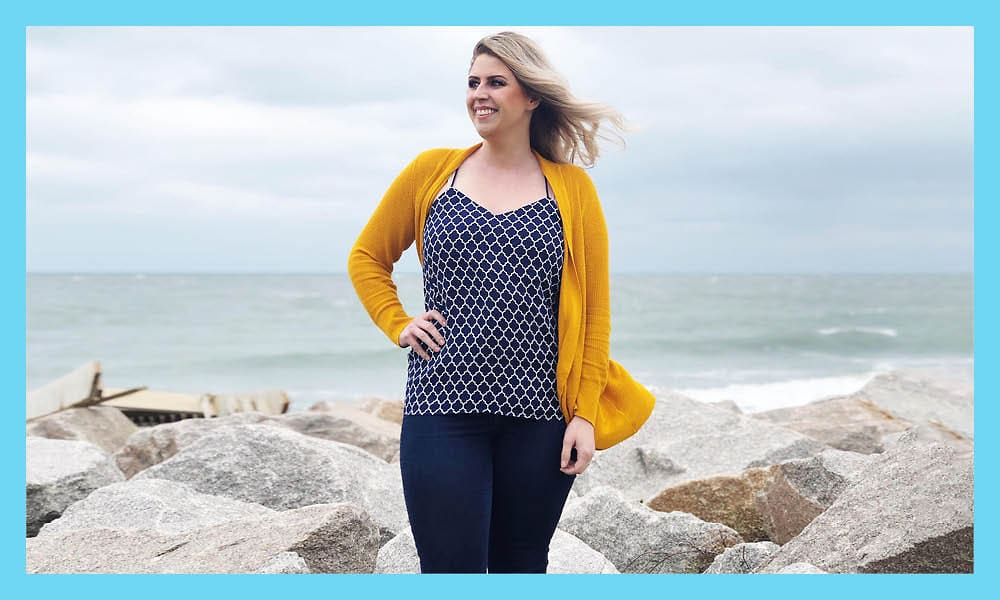
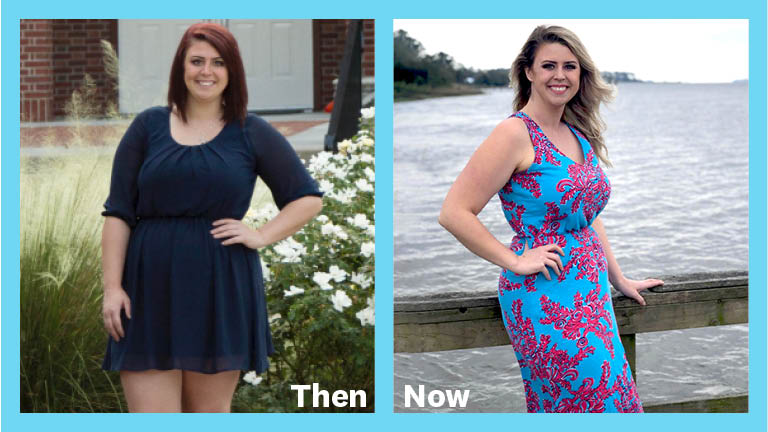
At 6 months, participants in a clinical trial of the WW weight-loss program lost an average of 9.7 lbs (5% of body weight). And, people who track their food more often lose more weight. When actual WW members track their food at least two times a week for 6 months they lose on average 16.6 lbs. (7.9% body weight). Natasha lost weight on a prior program and is continuing on PersonalPoints™.
As told to Katerina Gkionis
When my partner proposed to me in 2017, I hated the way I looked in my engagement photos: I’d gained 20 pounds during a year of battling health issues including chronic strep throat, a tonsillectomy, gallbladder removal, endometriosis, and mold exposure, and another 20 after easing off the medications that had made it difficult for me to digest food.
I desperately wanted to lose the extra weight before I walked down the aisle. After all, I didn’t recognize the person I had become. I didn’t like who I saw in the mirror.
Trying a restrictive diet
Around January 2018, I heard my work manager rave about the keto diet, which involves eating a high fat, low-carb, and moderate protein diet. After committing to eliminate pasta, potatoes, grains, and fruit—my favorite!—I stocked up on fatty meats and butter.
To achieve “ketosis,” the state of burning body fat instead of carbohydrates for energy, I began to track my “macros,” or macronutrients (aka, grams of fat, carbohydrates, and protein) and test my urine for ketones, the sign you’re in ketosis. At first, it worked, except that I developed some of the diet’s common side effects: My breath began to smell sour, my mouth always felt dry, and my urine had a strong, sweet smell.
There’s no doubt that my diet was odd: On days when I didn’t consume enough fat, I’d eat a “fat bomb” with ingredients like cream cheese and peanut butter. I slipped up just once during a road trip because it was too hard to stick to my routine away from home: It’s not like you can always get a fatty steak and butter in your coffee at a rest stop on the interstate. After that, when I tried to get back on track, a series of debilitating symptoms kicked in: I felt so lethargic that I had trouble staying awake during the day—all I wanted to do was nap, but when I slept, I’d get hot sweats. While I didn’t miss a day of work, I hated the way I felt for two whole weeks.
After about eight months of following the keto diet, I started to obsess about getting into ketosis, peeing on a test strip every single time I went to the bathroom. When I didn't get the results I was hoping for, I'd question my every effort: Although I knew I needed to allocate my calories with painstaking precision for the keto diet to work correctly, the test didn't say whether I’d eaten too much protein or too little fat. I felt lost—it was as if I was following a super strict diet for nothing. What’s more, my weight loss had stalled.
Cutting ties with keto
Around the same time, I decided to take another break from keto before a few summer trips with my fiancé. Without having to worry about whether I’d find the specific foods permitted on my diet, I stressed much less. It was fun to share meals and experiences without worrying about staying in ketosis.
Back at home, I had no desire to return to diet: It was way too hard. At the same time, some of my keto habits stuck, like adding butter to my morning coffee.
Over the course of a few months, I gained about 10 pounds back and started looking for another weight loss program.
RELATED: WW vs. The Ketogenic Diet
Searching for balance
In the fall of 2018, I joined WW with a friend who was already on the program. I knew WW would be totally different from the eating approach I’d become accustomed to. That said, after a year of telling myself, “Don’t eat this, don’t eat that,” retraining my brain was difficult. Although WW gives you the flexibility to eat whatever foods you’d like, every time I ate a sweet potato or piece of fruit I felt residual guilt from keto. To complicate things, my fiancé fully embraced the flexibility of my new eating approach: He’d make us huge plates of pasta for dinner with chocolate chip cookies for dessert. It would take me every ounce of willpower to say “no,” so I’d have a few and instantly regret it.
As a result, during my first three months on the program, I gained and lost the same five pounds. But unlike my experience on the keto diet, which provided no resources to troubleshoot on my own, I talked to my WW Coach. She suggested tracking foods and planning out meals ahead of time so I could leave room in my PersonalPoints Budget for foods like pizza.
After that Workshop, my fiancé agreed to stop baking every day, and we started going grocery shopping together using the WW App's barcode scanner to quickly assess a food’s PersonalPoints value. We mapped out our weekly meals, including dishes like chicken or grilled steak tacos made from corn tortillas, which have fewer PersonalPoints values than the flour ones.
I felt like I was in a groove—and then the holidays came. Travel plans prohibited me from attending a few of my weekly Workshops, and I expected the worst since vacationing had been my downfall on the keto diet. This time, when I got home in the New Year, I’d lost 6 pounds*—proof the program wasn’t just working, but flexible enough to work within the context of my lifestyle.
What Natasha ate on keto vs. WW
| Then: Keto | Now: WW | |
|---|---|---|
Breakfast | Coffee with butter and coconut oil | An everything bagel thin with a fried egg and black coffee with natural sweetener |
| Lunch | Thick broccoli and cheddar soup made with heavy whipping cream and salad with lemon juice dressing | Salad with grilled chicken, hard-boiled eggs, green and red peppers, and light dressing, or tuna salad made with light mayo plus whole wheat crackers |
Dinner | A fatty steak with green vegetables like asparagus or sautéed spinach with onion and mushrooms—and butter on everything | Zucchini-lentil pasta with chicken and Alfredo sauce or grilled fish with vegetables like carrots, asparagus, or broccoli and a baked sweet potato |
| Snacks | “Fat-bombs” containing full-fat cream cheese, butter, cocoa powder, and peanut butter | A protein shake, carrots and celery sticks dipped in ranch dressing made from non-fat Greek yogurt and spices |
Results without restriction
While keto was a diet, my new approach to eating feels more like a lifestyle choice. Not only do I have tons of food options whether I’m at home, eating out, or traveling, but I have tons of energy and love the way I look. I’ve lost 31 pounds so far, and I’m looking to lose about 10 more.
In retrospect, it’s become clear that my old keto diet wasn’t a sustainable solution for lifelong weight management. But WW? I can see myself sticking with the program for life. Having recently discovered new WW App features like Connect, the members-only social network I lean on for support, motivation, and recipe ideas, the program still feels fresh.
My fiancé and I have decided that we’re going to elope, so whenever we feel the urge to get married, we will! The best part: I know I’ll look and feel my best whenever we say, “I do.”
Explore more WW member weight loss transformations.
--
This article was reviewed for accuracy in July 2021 by Stephanie L. Fitzpatrick, PhD, senior manager for multicultural programs at WW. The WW Science Team is a dedicated group of experts who ensure all our solutions are rooted in the best possible research.
